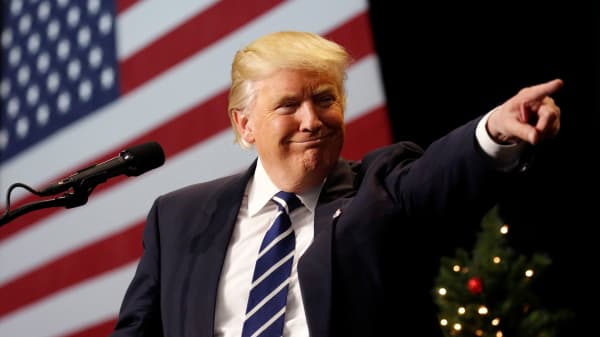It's been more than a week since President-elect Donald Trump was quoted in the Time Magazine "Person of the Year" issue saying he is going to do something to bring down prescription drug prices. Since then, Trump hasn't tweeted or said a word about any drug company or individual costly drug. But you can bet he will. And there are some very specific drugs he could likely target that are staring everyone right in the face.
The big drug companies should be grateful that in the interim, Trump's gone after Boeing on Twitter to attack the high price of Air Force One and used Twitter again to target Lockheed-Martin over the cost overruns on the F-35 stealth fighter. Expensive military expenditures are an easy target in the court of public opinion.
But if you want to talk easy, just think how much public support Trump could muster if he set his sights on the priciest prescription drugs the U.S. government pays for via Medicare and Medicaid. Americans may mostly want to see lower costs for military-grade jets, but there's no denying that's relatively low on the public's priority list compared to wanting lower drug prices and anything that can help keep Medicare and Medicaid afloat for generations to come.
When it comes to naming specific drugs so many of us need and the companies that make them, this is a slam dunk target for Trump.
And there's an even more enticing reason that going after pricey drugs by name probably appeals to Trump: Hillary Clinton's already done it... twice! Clinton first weighed in on Twitter to complain about big drug price hikes in September of 2015 when she specifically decried the jump in the cost for the specialty drug Daraprim.
Tweet
Her tweet sent biotech stocks tumbling that day and was one of the more dramatic moments in the case of the man behind that cost increase, the now-infamous Martin Shkreli. 11 months later, the scenario almost exactly repeated itself when Clinton used Twitter to wade into the EpiPen pricing controversy. She tweeted "there's no justification for these price hikes," and biotech stocks fell again.
Tweet
But in each case, it can easily be argued that Clinton's tweets led to positive results. Within a month of Clinton's tweet about Shkreli's Daraprim, a competing company announced it was selling a generic alternative for $1 per pill. And in the days after Clinton's tweet and Congressional hearings on EpiPen costs, EpiPen manufacturer Mylan announced steeper discount and rebate programs.
The bipartisan support Trump could get for going after pricey drugs goes beyond just the Hillary Clinton connection. Senator Claire McCaskill, a Democrat from Missouri, is one of two U.S. Senators who have just publicized a letter they've sent to Pfizer demanding answers to questions they have about the spiking price of its anti-opioid drug overdose drug naloxone.
And Senator Bernie Sanders called for a federal investigation last month into the makers of pricey insulin injection drugmakers. The list goes on. Bottom line, a Trump Twitter storm on drug costs has "political common ground" written all over it.
But let's get down to brass tacks, shall we? Which drugs made by which companies are most likely to be targeted by the Trump team? We have some clues based on Trump's base of support and the drugs the U.S. government spends the most on right now.
Trump's support among elderly voters was historically strong in this election, and that's why anything that's costing the Medicare Part D program big money has a good chance to be singled out. CNBC's Meg Tirell reported this week that Gilead's Hepatitis C drug Harvoni costs Medicare Part D the most at $7 billion per year. Sanofi's insulin injection pen Lantus comes in second with annual expenditures of $4.3 billion. And anti-cholesterol drug Crestor, made by AstraZeneca comes in third with a $2.8 billion yearly price tag.
There are other ripe targets too, like almost all the drugs used to fight the common ailment of macular degeneration which is a leading cause of blindness for the people 60 and up. The average cost per unit for anti-macular degeneration drug Eyelea, made by Regeneron, is a whopping $35,457.
Another macular degeneration drug made jointly by Roche and Genentech comes in second in unit cost at $35,331. And a third macular degeneration treatment provided by doctors through Medicare Part B, also made by Regeneron, is the number one priciest drug in that program. It costs Medicare Part B $1.9 billion per year.
Of course, there are so many more pricey prescription drugs out there with a number of them undergoing recent price spikes. But drugs that particularly are used by the elderly seem like the best bet if Trump is indeed inclined to take on Big Pharma. And considering the immediate impact his tweets have had on companies and their entire related sectors, the CEOs of some of the bigger drug companies might want to try to preempt this threat with a call or two to Trump Tower before it's too late.




